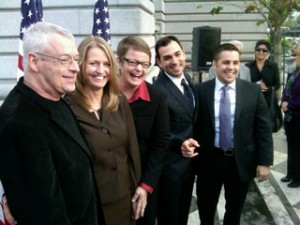In the 2-1 decision validating Walker's ruling, the court wrote: "Proposition 8 serves no purpose, and has no effect, other than to lessen the status and human dignity of gays and lesbians in California, and to officially reclassify their relationships and families as inferior to those of opposite-sex couples."
Update 10:30 a.m. KQED's Scott Shafer today talked to Vik Amar of the UC Davis School of Law, who said there were actually two requests before the court:
- A request to the original three-judge panel for a rehearing. That request was denied 2 to 1, with Judge Smith, who wrote the original dissent to the decision, in the minority.
- Having lost that vote, a request for an en banc hearing was then put to the full court, and at least three judges voted to rehear the case. The opinion, written by Judge O’Scannlain, was publicly joined by Judges Byee and Bea. Other judges may have also voted for a rehearing but declined to make their names public.
Update 10:40 a.m. In February, Hastings law professor Rory Little told Scott Shafer he thought Prop 8 supporters were pretty disappointed with Judge Smith's dissent to the original decision, "which was not a ringing Scalia-like forceful 'this is wrong.' It was more like 'we should be cautious, although there are a lot of good points here.'
Little continued: "Here's the best result for proponents -- they don't get enough votes for en banc, but they get a forceful dissent from the denial of en banc from O`Scannlain and Bybee and whoever they can pick up, which they can then use as their petition to the Supreme Court. Bybee and O`Scannlain have had a number of cases granted in the last five years from their dissents from en banc. Those guys are in the business of writing cert petitions, basically. And they're powerful writers."
Well, Judge O'Scannlain did indeed write a dissent...
A few weeks ago, subsequent to oral argument in this case, the President of the United States ignited a media firestorm by announcing that he supports same-sex marriage as a policy matter. Drawing less attention, however, were his comments that the Constitution left this matter to the States and that “one of the things that [he]’d like to see is–that [the] conversation continue in a respectful way.”
Today our court has silenced any such respectful conversation. Based on a two-judge majority’s gross misapplication of Romer v. Evans, we have now declared that animus must have been the only conceivable motivation for a sovereign State to have remained committed to a definition of marriage that has existed for millennia. Even worse, we have overruled the will of seven million California Proposition 8 voters based on a reading of Romer that would be unrecognizable to the Justices who joined it, to those who dissented from it, and to the judges from sister circuits who have since interpreted it. We should not have so roundly trumped California’s democratic process without at least discussing this unparalleled decision as an en banc court.
And the retort from Judges Reinhardt and Hawkins, who made up the majority in February's 2-1 decision:
We are puzzled by our dissenting colleagues’ unusual reliance on the President’s views regarding the Constitution, especially as the President did not discuss the narrow issue that we decided in our opinion. We held only that under the particular circumstances relating to California’s Proposition 8, that measure was invalid. In line with the rules governing judicial resolution of constitutional issues, we did not resolve the fundamental question that both sides asked us to: whether the Constitution prohibits the states from banning same-sex marriage. That question may be decided in the near future, but if so, it should be in some other case, at some other time.
The reference here to the "the particular circumstances relating to California’s Proposition 8" and to the lack of resolution to "the fundamental question [of] whether the Constitution prohibits the states from banning same-sex marriage" may also be noteworthy.
After the Ninth Circuit panel's decision against Prop 8 in February, UC Davis' Vik Amar told Scott Shafer that Reinhardt and Hawkins may have tailored their decision in the narrowest way possible, making it applicable only to California, so as to give the ruling the best possible chance of not being taken up by the U.S. Supreme Court.
But Amar also said: "There was no way the Ninth circuit was going to rule for the plaintiffs and not create a significant risk that the Supreme Court would step in. The question wasn't whether the Supreme Court had its eye on this case, the question was how do you minimize that, and I think they tried to do that by keeping the reasoning specific to California."
Professor Rory Little of Hastings agreed with that today, in an interview with KQED's Rachael Myrow. "I think it's a little naieve to believe that the court will see this as limited to just California. Certainly the Ninth Circuit's ruling only relates to California, but its analysis is much broader than just California. And of course the Ninth Circuit governs the entire western United states, so its analysis would be precedent for the entire [region].
"I think the Supreme Court is likely to think this issue is ripe, this is ready for a national decision. One way or the other, there are enough states that have gone in different directions, there's enough controversy about it, [so] let's try to put the issue to rest one way or the other."
Reaction and coverage from around the web below...
Read the full decision here:
